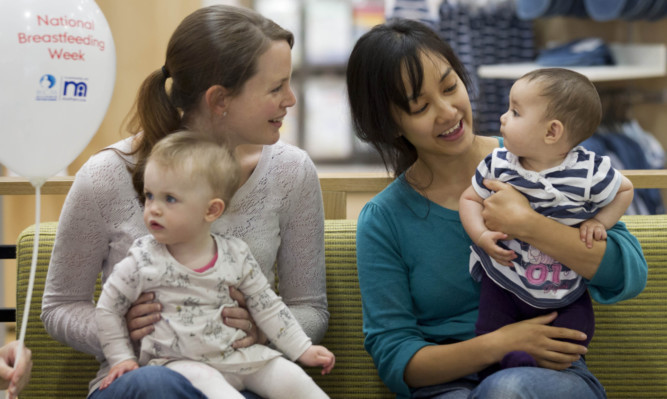“Breast is best” is the advice given to women.
But in Tayside, fewer than half of new mums are breastfeeding.
In 2014-15, 37.5% of women exclusively breast fed by the time of their first visit by a health worker, with 48.5% also using formula.
At the 6-8 week health visit, just 26.8% new mums in Tayside were still breastfeeding.
The general trend over the past 10 years has been one of decline, with 41.8% of Tayside women breastfeeding in 2005-06 and a gradual year-on-year decrease observed since then.
Figures for the NHS Fife area painted a similar picture, with 34% of women breastfeeding exclusively at their first visit.
This number dropped to 23.6% at the 6-8 week review.
Katy Brown, leader of Tayside and Fife’s La Leche League, which supports local breastfeeding mums, said very few women are physically unable to breastfeed.
She said: “Societal expectations and lack of support are far bigger factors.
“Women do not always get the support they need with initial problems, which can lead to a new mother starting to doubt her ability to breastfeed.
“We grow up in a society where we still don’t see our mothers, sisters, aunts or many women breastfeeding in public.
“Therefore, many women feel like it’s not the norm.
“Our group always welcomes new mothers and we find that support can really make a difference.”
“Breast milk provides all the nutrients a baby needs for at least the first six months of life, and continues to be an important part of a baby’s diet for as long as a baby breastfeeds.”
NHS guidelines recommended exclusive breastfeeding for around the first six months of a baby’s life.
After this, other foods can be introduced alongside breastfeeding, which can continue for as long as the mum and baby wish.
Antibodies in breast milk protect the baby from illness, including ear infections, stomach upsets and respiratory problems, and breastfeeding mums have reduced rates of breast and ovarian cancer.
